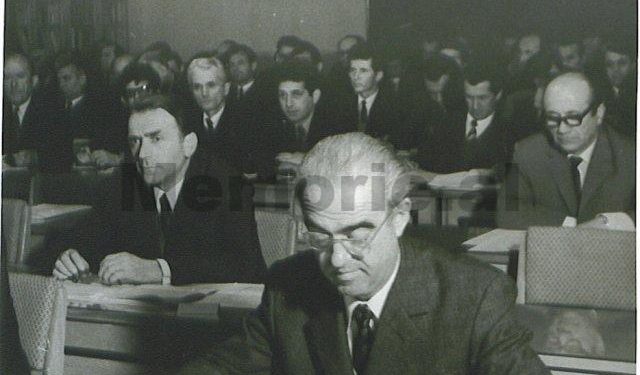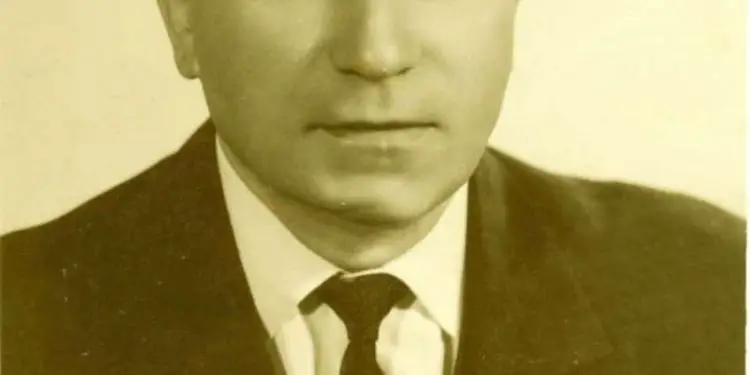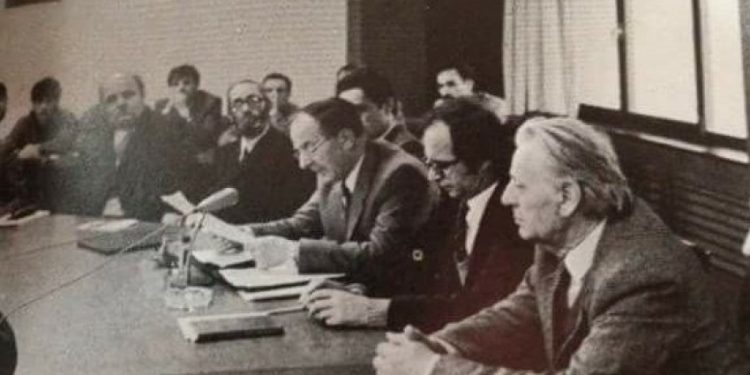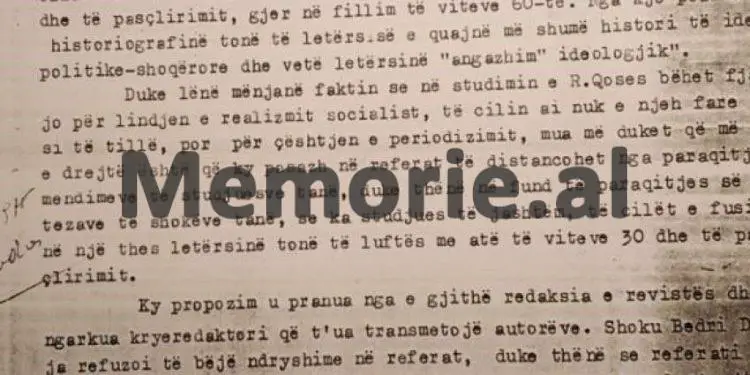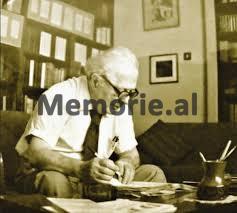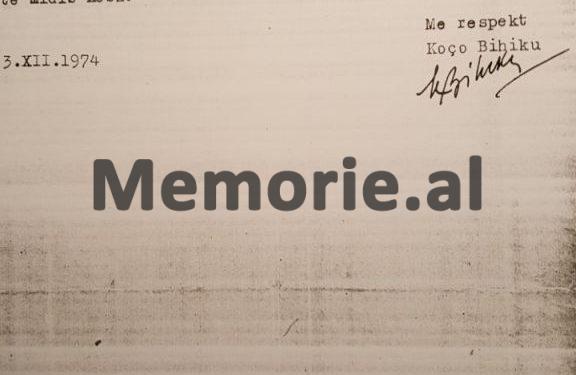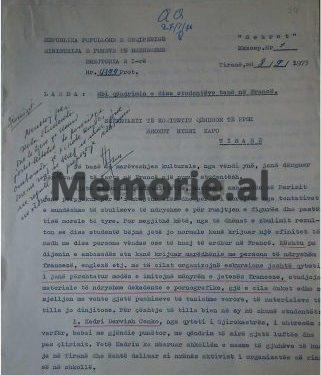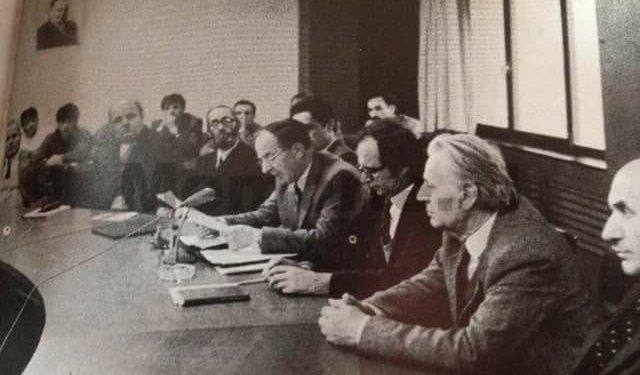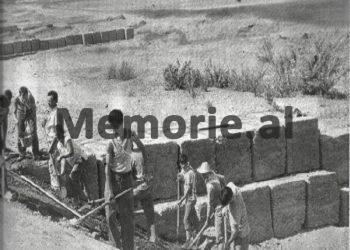Dashnor Kaloçi
Memorie.al /publishes an archival document extracted from the Central State Archive in Tirana (fund 14. KQ PPSH. Ap. Struktural), dated December 3, 1974, where the well-known researcher and literary critic, Koço Bihiku, sent them a letter, Kahreman Ylli, who at that time was Hysni Kapos’ assistant for the problems of education and culture, while for many years he had served as Rector of the University of Tirana. According to the document in question, the problem that worried Bihik was the “National Conference of Studies on the Anti-Fascist National Liberation War of the Albanian people”, which was held in those days in Tirana. Bihik’s concern had to do with the fact that the authors of the paper (Prof. Bedri Dedja and Prof. Dhimitër Shuteriqi), had ‘confounded’ their theses, with those of Prof. Rexhep Qosjes, who according to him (Bihik), “has put in a bag our literature of the War, with that of the ’30s and after the liberation”! And this, according to him, had to be fixed, but the authors Dedja and Shuteriqi, refused to change the paper!
In the framework of an agreement on cultural and educational cooperation that official Tirana had concluded with the Autonomous Province of Kosovo, Montenegro and the Republic of Macedonia, (agreement concluded in Belgrade sometime after the military aggression of the Soviet Union in Czechoslovakia, when they began ” honeymoon ”between Tirana and Belgrade) in the early 1970s, many reciprocal visits were made by personalities in the field of education, art, culture and Albanian literature, on both sides of the border.
In this context (as we have seen in other documents in the pages of this book), at that time Albania was visited by well-known names, such as: Rexhep Qosja, Bekim Fehmiu, Ali Hadri, Emin Pllana, Blerim Luzha, Ali Aliu, Agim Vinca, Ibrahim Rugova, Skënder Riza, Emin Pllana, etc. etc, and also in Kosovo, Macedonia and Montenegro, went for visits, seminars, conferences, scientific sessions, promotions, lectures, etc., and their colleagues from Albania, such as: Androkli Kostallari, Dhimitër Shuteriqi, Aleks Buda, Dritëro Agolli, Ismail Kadare, Pirro Mani, Agim Zajmi, Nasho Jorgaqi etc.
Always in the framework of this agreement and a wider cooperation aimed at that time between the State University of Tirana, our Academy of Sciences and other institutions under its auspices, with counterparts from Kosovo, Montenegro and the Republic of Macedonia, many articles , papers, papers and various studies of Albanian authors living and working on the other side of the border, found a place and were published in various texts issued by the University of Tirana, the Academy of Sciences and other institutions under its auspices. However, official Tirana did not lower its vigilance for a moment towards the “inflows” on the other side of the border, on the contrary, their works were viewed with a magnifying glass.
In connection with this, there is also this archival document, dated December 3, 1974, where the well-known researcher and literary critic, Koço Bihiku, sent a letter to Kahreman Ylli, who at that time was Hysni Kapos’ assistant for the problems of education and culture, while for many years he had served as Rector of the University of Tirana. As we will see from the document in question, the problem that has troubled Bihik, who from that time onwards (until the end of the communist regime) was known as a conservative and ardent fanatic of socialist realism, has been “National Conference of Studies on the Anti-Fascist National Liberation War of the Albanian people”, which was held in those days. Among other things, in the material of that conference, the lecture given by professors Bedri Dedja and Dhimitër S. Shuteriqi would be published, with the topic: “Problems of culture during the Anti-Fascist National Liberation War of the Albanian people”.
Bihik’s concern has to do with the fact that the authors of the paper (Dedja and Shuteriqi), have confused “our researchers” with the thesis of prof. Rexhep Qosjes, who according to him (Bihik), “has put in a bag our literature of the War, with that of the ’30s and after the liberation”. And this, according to him, should be regulated, but the authors Bedri Dedja and Dhimitër Shuteriqi, have not agreed to change the paper, dividing there with “a demarcation line” the position of prof. Qosjes from that of “our researchers”. But this does not seem to have happened, and for this reason, Bihiku wrote the letter in question, where at the end of it he writes: “Comrade Kahreman, I am addressing you with this letter in the hope that you will intervene to block the way for these incorrect performances between us ”.
We do not know how the fate of the problem raised by Bihiku went further, but what is noticed in his letter to Kareman Ylli, is the fact that; although regarding the theses of prof. Qosjes (who “puts in a bag our literature of the War with that of the ’30s and the post-liberation”), the relevant instances were asked, i.e. The Central Committee, the answer was: “to leave the case of Rexhep Qosja in the papers, so as not to aggravate relations with him”.
Most likely where we “release” to prof. Qosjes, has to do with his pro-position and in line with the official policy pursued by the communist regime of Tirana, which we have seen in one of the previous chapters of this book (report-information of Prof. Androkli Kostallari for leadership regarding the visit of Prof. Rexhep Qosja to Albania in 1970), where Kostallari writes, among other things: raging of
Albania in these 25 years to convince that “history can be shortened”. “The main thing,” he said, “is that you do all this relying on your own strength.” He said: “He is convinced that only socialism could save the Albanian people from the miserable and backward situation in which they found themselves in the past.”
Perhaps from this “finding” of prof. Qosjes, for the communist regime of Enver Hoxha, came the official attitude towards him, until the end of the ’80s, when Ramiz Alia (on August 29, 1989), in one of the meetings of the Secretariat of the Central Committee of the ALP , ordered Foto Çami to invite Rexhep Qosja to Albania and to promote his book, “The big message”. (See: “Kadare in 101 documents of the Palace of Dreams”, Dashnor Kaloçi, published by UET PRESS, Tirana 2016, chapter 96, p.542). Which leaves no doubt that he (Qosja) was a favorite of the communist regime in Tirana, or rather did not oppose that regime. Like most of the documents in this book, this one is published in full.
Koço Bihik’s letter to Kahreman Ylli
Comrade Kahreman
These days the editorial board of “Philological Studies” gathered which decided to publish the materials of the National Conference of Studies on the Anti-Fascist National Liberation War of the Albanian people, among others the lecture of Bedri Dede and comrade Dhimitër S. Shuteriqi “Problems of culture during the Anti-Fascist National Liberation War of the Albanian people ”.
In the papers there are many inaccuracies regarding what has been said about the issue of the birth of socialist realism in Albanian literature, but what, in my opinion, should be corrected before being published in our magazine, is the fact that the authors of the paper arguing with our researchers include Rexhep Qosje in it, thus attributing to the former the views of the latter, which is not at all fair. Thus e.g. on p. 19 of the paper states: “There is also a thesis, which puts in a bag our literature with the War with that of the ’30s and post-liberation, until the early’ 60s, From this position our historiography of literature call more stories of socio-political ideas and literature itself “ideological commitment”.
Leaving aside the fact that in Rexhep Qosja’s study it is not about the birth of socialist realism, which he does not know at all, but about the issue of periodization, it seems to me that it is fairer that this passage in the paper to distance himself from the presentation of the opinions of our scholars, saying at the end of the presentation of the theses of our friends, that there are external scholars who put in a bag our literature of the War with that of the ’30s and post-liberation .
Kahreman Ylli
This proposal was accepted by the entire editorial board of the magazine and the editor-in-chief was tasked with transmitting it to the authors. Comrade Bedri Dedja refused to make changes to the papers, saying that the paper was published and thus sanctioned by the higher authorities. Those who have the opposite opinion, let them express it on the pages of our bodies. Regarding Rexhep Qose, he said that he talked to the relevant instances, which told him to leave the case of Rexhep Qose in the papers, so as not to strain relations with him.
Comrade Androkli as editor-in-chief informed us of this opinion of Comrade Bedri Dede, adding that it could not be raised against the will of the authors.
It does not seem fair to me that this issue is being resolved in this way, because this is an incorrect attitude towards our scholars, who have no reason to confuse them with Rexhep Qose, who stands in completely opposite ideological positions and methodological with us. None of our researchers uses the word “ideological commitment” for literature, and does not think that in the development of literature “factors of crucial importance” have its internal development factors, as the authors of the paper say. The insistence of comrades Bedri Dedja and Dhimitër Shuteriqi not to make any changes in the papers regarding this point, does not seem to me to be correct.
Comrade Kahreman, I am addressing you with this letter in the hope that you will intervene to stop these incorrect performances between us./Memorie.al
3.XII.1974
With respect
Koço Bihiku




